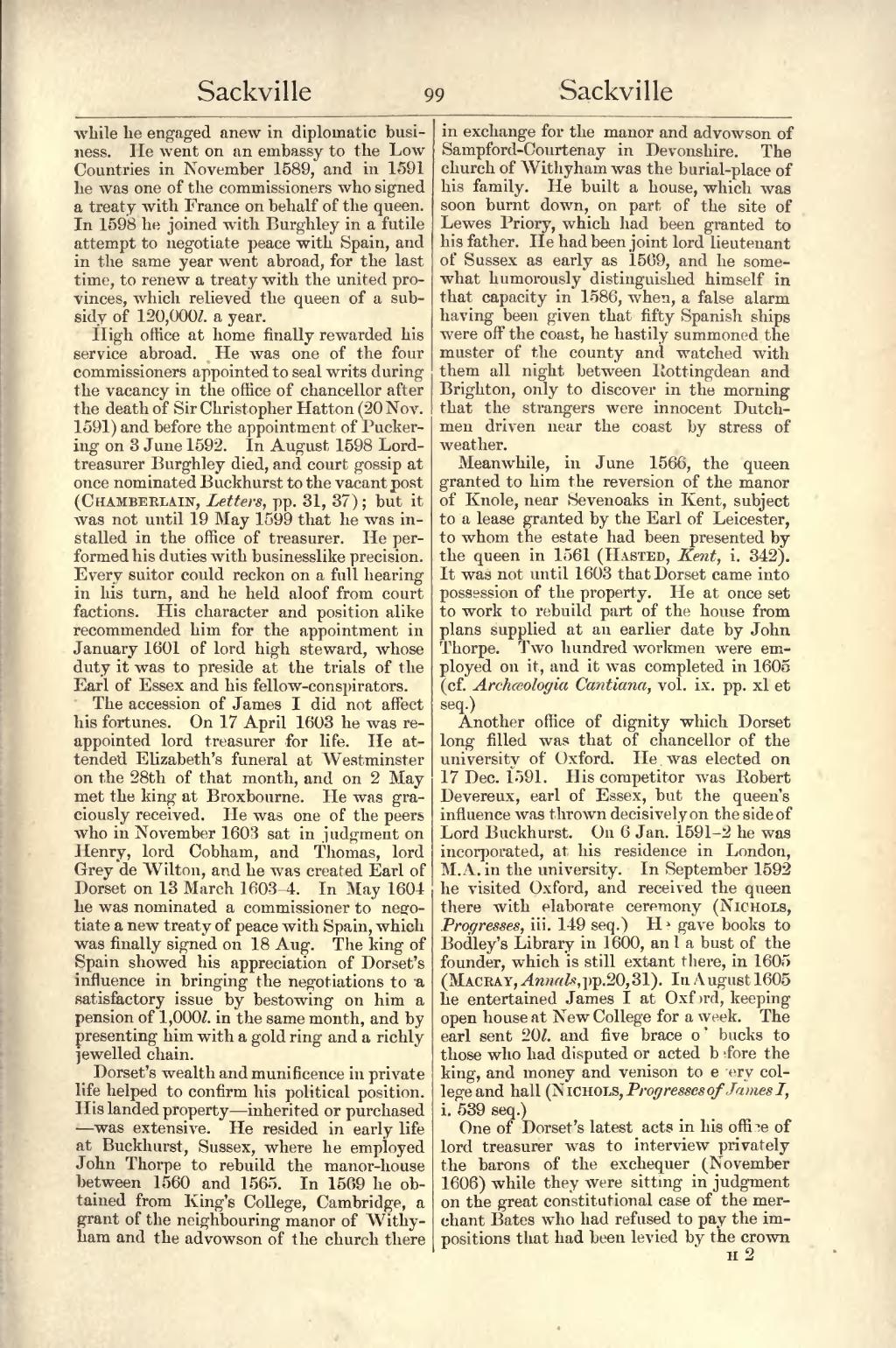while he engaged anew in diplomatic business. He went on an embassy to the Low Countries in November 1589, and in 1591 he was one of the commissioners who signed a treaty with France on behalf of the queen. In 1598 he joined with Burghley in a futile attempt to negotiate peace with Spain, and in the same year went abroad, for the last time, to renew a treaty with the united provinces, which relieved the queen of a subsidy of 120,000l. a year.
High office at home finally rewarded his service abroad. He was one of the four commissioners appointed to seal writs during the vacancy in the office of chancellor after the death of Sir Christopher Hatton (20 Nov. 1591) and before the appointment of Puckering on 3 June 1592. In August 1598 Lord-treasurer Burghley died, and court gossip at once nominated Buckhurst to the vacant post (Chamberlain, Letters, pp. 31, 37); but it was not until 19 May 1599 that he was installed in the office of treasurer. He performed his duties with businesslike precision. Every suitor could reckon on a full hearing in his turn, and he held aloof from court factions. His character and position alike recommended him for the appointment in January 1601 of lord high steward, whose duty it was to preside at the trials of the Earl of Essex and his fellow-conspirators.
The accession of James I did not affect his fortunes. On 17 April 1603 he was reappointed lord treasurer for life. He attended Elizabeth's funeral at Westminster on the 28th of that month, and on 2 May met the king at Broxbourne. He was graciously received. He was one of the peers who in November 1603 sat in judgment on Henry, lord Cobham, and Thomas, lord Grey de Wilton, and he was created Earl of Dorset on 13 March 1603–4. In May 1604 he was nominated a commissioner to negotiate a new treaty of peace with Spain, which was finally signed on 18 Aug. The king of Spain showed his appreciation of Dorset's influence in bringing the negotiations to a satisfactory issue by bestowing on him a pension of 1,000l. in the same month, and by presenting him with a gold ring and a richly jewelled chain.
Dorset's wealth and munificence in private life helped to confirm his political position. His landed property—inherited or purchased—was extensive. He resided in early life at Buckhurst, Sussex, where he employed John Thorpe to rebuild the manor-house between 1560 and 1565. In 1569 he obtained from King's College, Cambridge, a grant of the neighbouring manor of Withyham and the advowson of the church there in exchange for the manor and advowson of Sampford-Courtenay in Devonshire. The church of Withyham was the burial-place of his family. He built a house, which was soon burnt down, on part of the site of Lewes Priory, which had been granted to his father. He had been joint lord lieutenant of Sussex as early as 1569, and he somewhat humorously distinguished himself in that capacity in 1586, when, a false alarm having been given that fifty Spanish ships were off the coast, he hastily summoned the muster of the county and watched with them all night between Rottingdean and Brighton, only to discover in the morning that the strangers were innocent Dutchmen driven near the coast by stress of weather.
Meanwhile, in June 1566, the queen granted to him the reversion of the manor of Knole, near Sevenoaks in Kent, subject to a lease granted by the Earl of Leicester, to whom the estate had been presented by the queen in 1561 (Hasted, Kent, i. 342). It was not until 1603 that Dorset came into possession of the property. He at once set to work to rebuild part of the house from plans supplied at an earlier date by John Thorpe. Two hundred workmen were employed on it, and it was completed in 1605 (cf. Archæologia Cantiana, vol. ix. pp. xl et seq.).
Another office of dignity which Dorset long filled was that of chancellor of the university of Oxford. He was elected on 17 Dec. 1591. His competitor was Robert Devereux, earl of Essex, but the queen's influence was thrown decisively on the side of Lord Buckhurst. On 6 Jan. 1591–2 he was incorporated, at his residence in London, M.A. in the university. In September 1592 he visited Oxford, and received the queen there with elaborate ceremony (Nichols, Progresses, iii. 149 seq.). He gave books to Bodley's Library in 1600, and a bust of the founder, which is still extant there, in 1605 (Macray, Annals, pp. 20, 31). In August 1605 he entertained James I at Oxford, keeping open house at New College for a week. The earl sent 20l. and five brace of bucks to those who had disputed or acted before the king, and money and venison to every college and hall (Nichols, Progresses of James I, i. 539 seq.).
One of Dorset's latest acts in his office of lord treasurer was to interview privately the barons of the exchequer (November 1606) while they were sitting in judgment on the great constitutional case of the merchant Bates who had refused to pay the impositions that had been levied by the crown
